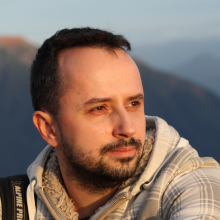Polish literature

Szymon Babuchowski
Born in 1977 in Katowice, he is a poet, journalist, and literary critic (the author of a PhD on the poetry of Wojciech Wencel, defended at the Silesian University in 2007), a member of the bands Dobre Duchy (2006-2011) and Dobre Ludzie (since 2013). He received distinctions in the Father Józef Baka Poetry Competition (2002), The Father Janusz St. Pasierb Award (2007), and The Little Phoenix Award of the Catholic Publishers’ Association (2009). In 2015 the selection Before You Come: Metaphysical and Religious Poems was nominated for the Orpheus – the K. I. Gałczyński Poetry Award. He runs the Culture Section of Gość Niedzielny and edits the poetry section for 44/ Czterdzieści i Cztery magazine. He conceived and co-wrote a selection of reportage on South America titled The Church at the Edge of the World (2013), and a long interview with Natalia Niemen, Heaven Comes Later (2016).
Szymon Babuchowski’s work adheres to the religious-philosophical movement in contemporary poetry (W. Wencel, P. Sarna, M. Cielecki etc.), sometimes called “new metaphysics” (K. Maliszewski), for whom Christian tradition is the prevailing point of reference. We see some signals of a poetry world view drawing from a religious axiological horizon in Babuchowski’s first volume (Matters of Life, Matters of Death, 2002; mentions in the third edition of the Father Baka Competition). In later poetry collections (The Time of Clattering Clackers, 2004; Poems to the Wind, 2008), the search for the sacred becomes an essential part of the poet’s lyrical imagination, though the everyday details of life still hold an important place. Religious symbolism also encourages this reading of Babuchowski’s best volume, Departure Schedule (2011), dedicated to his wife, who speaks of real journeys from the author’s life, and evokes the topos of the road as a metaphor for God’s plan (incidentally, the poetry goes beyond this sphere into communal experiences, such as the Smoleńsk disaster).
The poetic spiritual maturation of the protagonist (the alter ego of the author), first involving youthful romantic disappointments, doubts, and hesitations, over time, after some essential inner cleansing and finding peace in the heart, being reborn into a testimony of a Christian affirmation of human existence. Published in 2014, Babuchowski’s selection of poems Before You Come: Metaphysical and Religious Poems – the second after The Orange Tree (2011) – brilliantly visualizes the sacred dimension of his poetry. Among its key contemporary patrons is Wojciech Wencel, and from the more remote past, Jerzy Liebert. Critics also point out the poet’s affinity for literary tradition (e.g. “meliczny,” or language-oriented poetry), and a style that sometimes unexpectedly breaks down into modern forms of communication (text messages).
Babuchowski presents his work in musical form with his band, Dobre Ludzie (an extension of the Babuchowski & Filipowicz project). In conceiving these poetic songs and singing them, he takes the role of the “music-making poet” (as he calls himself). The stylistically diverse work of the group (Latino music, rock, blues, jazz) eludes easy classification. Their crowning achievement was the album Gentle Crossing, released in 2015. Babuchowski’s poems have been translated into Spanish, French, Czech, Serbian, Croatian, Slovenian, and Montenegran.
Karol Alichnowicz
BIBLIOGRAPHY
Poetry
- 2002 – Sprawy życia, sprawy śmierci
- 2004 – Czas stukających kołatek
- 2008 – Wiersze na wiatr
- 2011 – Rozkład jazdy
- 2011 – Drzewo pomarańczowe. Wybór wierszy z lat 1996–2011
- 2014 – Zanim przyjdziesz. Wiersze metafizyczne i religijne
- 2018 – Jak daleko
Reportage and interviews
- 2013 – Kościół na końcu świata. Reportaże z Ameryki Południowej
- 2016 – Niebo będzie później
Music
- 2015 – Łagodne przejście
- 2019 – Dalej